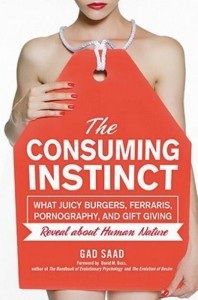Geography
- Brasil (2)
- São Paulo (2)
- Canada (3)
- Ontario (3)
- Germany (9)
- Berlin (3)
- Hamburg (2)
- Hessen (1)
- Niedersachsen (1)
- Nordrhein-Westfalen (2)
- Ireland (1)
- Dublin (1)
- Spain (1)
- Barcelona (1)
- Switzerland (3)
- Zürich (3)
- UK (153)
- Berkshire (4)
- Birmingham (3)
- Buckinghamshire (2)
- Cambridgeshire (1)
- Clwyd (1)
- Durham (1)
- Essex (2)
- Hampshire (4)
- Hertfordshire (26)
- Kent (1)
- Lincolnshire (1)
- London (82)
- Manchester (2)
- Medway (1)
- Midlands (1)
- Northumberland (1)
- Nottinghamshire (1)
- Oxfordshire (3)
- Salford (1)
- Shropshire (1)
- Surrey (8)
- Sussex (2)
- Swansea (1)
- Warwickshire (2)
- Yorkshire (1)
- US (3)
- Los Angeles (1)
- New Jersey (1)
- New York (1)
Sex
Coming soon
Ads
The Consuming Instinct: What Juicy Burgers, Ferraris, Pornography, and Gift Giving Reveal About Human Nature
July 31, 2011
Evolution and consumer choice Baby you can drive my genes
Human beings are bad at making rational decisions and finding happiness. But these hiccups make for good reading, as is clear from the explosion of books on the subject. Joining the fray is “The Consuming Instinct” by Gad Saad, which considers human behaviour through a lens of biology and natural selection. He offers reassurance that some of man’s odder impulses, from high-stakes gambling to bungee-jumping or wearing stiletto heels, are rooted in evolutionary necessity.
“Much of what we do as consumers is ultimately related to sex,” Mr Saad writes. Men are programmed to hunt for young, attractive and fertile women (and as many as possible), whereas women tend to seek out a lone, socially powerful Mr Right—the better to raise a family with. This creates different approaches, with women investing in their looks and men in their status. For women, long hair functions as a sign of health and youth, and cosmetics mimic cues of sexual arousal. As for high-heels, they hoist the derrière and make the gait more feminine and physically attractive. Men who aren’t tall, dark and handsome can compensate by wearing high-status clothing (no woman, it is said, can resist a man in surgical scrubs) or driving a fancy car. Studies show that men driving a Porsche experience rising testosterone levels, as it is an act of sexual signalling.
Ideals of sexiness are universal, contrary to arguments that media images are to blame. Most advertisements feature people with perfectly symmetrical faces, as this is a sign of phenotypic quality—or good genes. A deep male voice is inherently attractive, as it indicates greater exposure to pubertal testosterone and is linked to reproductive fitness. Even in cultures without access to mass media, the optimum waist-to-hip ratio for women is around 0.7, which corresponds most closely to an hourglass shape, and is linked to fertility. In addition, women often send subtle (and subconscious) come-hither cues at the most fertile time of the month.
Mr Saad has delivered a light round-up of the latest studies in evolutionary behavioural science. But he does not limit his observations to sex-specific characteristics. He also includes notes on how people handle food, family, friendship and social hierarchies. Gift-giving between friends, for example, strengthens non-kin bonds as people choose friends who can reciprocate. And an adaptation called the “variety effect” makes it nearly impossible to not overeat at a buffet, as a wider choice of dishes leads to a higher calorie intake—in order to maximise nutrient sources and minimise the toxins from a single food source. Parents tend to be more protective of their daughters than their sons because the familial costs of pregnancy are higher. As for concerns over paternity, fathers instinctively provide the greatest investment in children who look like them, and maternal grandmothers (the lone grandparent who has no paternal uncertainty) tend to be the most involved.
Critics may complain that viewing all behaviour through a prism of natural selection is reductive. But much of the research is convincing. Less credible is Mr Saad, who has a tendency to drench his writing with pop-cultural references and enjoys using television shows to emphasise a point. He spends much of the book patiently explaining the evolutionary roots of unsavoury desires, such as infidelity and hard-core pornography, but then loses all tolerance with what he sees as the duplicitous “hope peddling” of religion. Don’t get him started on self-help books. Mr Saad is a zealous advocate of evolutionary psychology, but readers should look elsewhere for serious scholarship.
Source: economist.com/node/21524805
Short link:
![]()
![]()
![]() Copy - http://links2.me/~QZDk3$3P
Copy - http://links2.me/~QZDk3$3P
No Comments »
No comments yet.
RSS feed for comments on this post.
Leave a comment
You must be logged in to post a comment.
